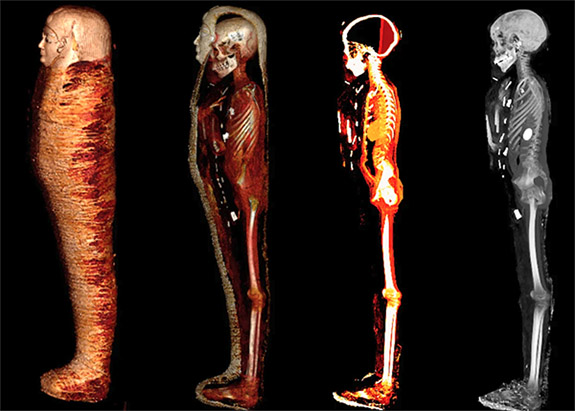Radiologists Use CT Scans to 'Digitally Unwrap' Egypt's Mummified 'Golden Boy'
Radiologists at Cairo University utilized cutting-edge CT scanning technology to "digitally unwrap" Egypt's mummified "Golden Boy," a teenager buried 2,300 years ago. The 3D scans revealed that the young man, just over four feet tall, set out on his arduous journey to the afterlife equipped with a golden heart scarab, golden tongue and 49 protective amulets made from gold, colored stones and brightly colored ceramics.
Interestingly, the Golden Boy had languished in the cellar of the famed Egyptian Museum since 1916, shortly after he was unearthed at Nag el-Hassay, a cemetery in southern Egypt. According to the researchers, the basement of the museum is crowded with many mummies that have never been studied or displayed.
The new computed tomography (CT) technology allowed the scientists to create a completed 3D image of the well-preserved body and its adornments without the need for destructive dissection. It also allowed them to create a precise mapping of where each amulet was placed between the wrappings or within the body. The scan revealed that the amulets seemed to be arranged in three distinct columns.
As seen in the illustration, above, the mummy was digitally unwrapped in four stages.
Still fully intact, the Golden Boy has been elevated from the basement to the main exhibition hall of Cairo's Egyptian Museum and will be accompanied by CT images and a 3D copy of his heart scarab. The display is designed to provide more insight into the mummification process and the death rites of ancient Egyptians.
"The display's goal was to humanize this individual from the past to teach modern people about life in ancient times," the researchers wrote in the study published recently in the journal Frontiers in Medicine.
The scientists were able to determine from his non-erupted wisdom teeth that the Golden Boy was only 14 or 15 years old when he passed away. He had healthy teeth and bones and displayed no evidence of poor nutrition or disease. He was likely a member of a very affluent family.
The boy's brain had been replaced with resin, but his heart remained in his chest as a spiritual symbol. A golden heart amulet had been placed near his actual heart in the chest cavity.
“The large, golden heart scarab amulet is really amazing, especially after I printed it and was able to hold it in my hands,” said Sahar Saleem, a professor of radiology at the faculty of medicine at Cairo University and a co-author of the study. “There were engraved marks on the back of the 3D-printed amulet that could represent inscriptions and spells.”
A gold tongue amulet was placed inside the Golden Boy's mouth to ensure the deceased could speak in the afterlife.
The mummy's external ornamentation included a gilded head mask inlaid with precious stones, a protective chest covering and a pair of basic white sandals.
"According to the ancient Egyptians' ritual Book of The Dead, the deceased had to wear white sandals to be pious and clean before reciting its verses," Saleem said.
The Golden Boy's body had been placed inside two nested coffins. The outer coffin was plain and inscribed with Greek letters, while the inner wooden sarcophagus featured decorative patterns and a gilded face.
According to the researchers, the study suggests that ancient Egyptians valued their children and provided them with ritual treatment.
Credit: Image courtesy of SN Saleem, SA Seddik, M el-Halwagy.







